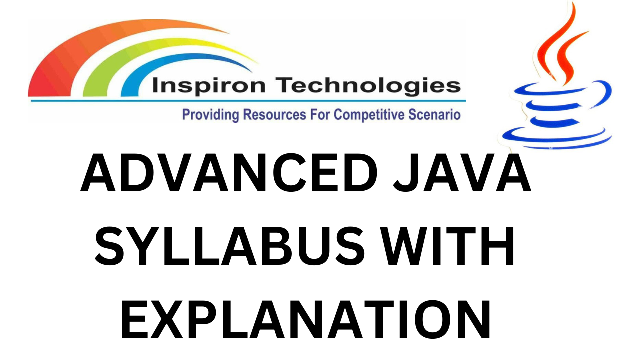Advance Java Syllabus with Explanation

Advanced Java typically covers more advanced topics beyond the basics of Core Java. Here's a syllabus along with explanations for each topic:
Servlets and JSP (JavaServer Pages):
Servlets and JSP are Java technologies used to develop web applications.
Servlets are Java programs that run on the server-side, handling client requests and generating responses.
JSP is a technology that allows embedding Java code in HTML pages to dynamically generate content.
Java Database Connectivity (JDBC):
JDBC is a Java API for connecting and executing SQL queries on databases.
It provides a set of classes and interfaces for database operations like connecting to databases, executing SQL queries, and processing results.
Enterprise JavaBeans (EJB):
EJB is a server-side component architecture for building distributed enterprise applications in Java.
It provides features like transaction management, security, and scalability for enterprise applications.
Java Persistence API (JPA):
JPA is a Java specification for accessing, managing, and persisting data between Java objects and relational databases.
It provides a set of interfaces and annotations for defining entity classes, relationships between entities, and performing database operations.
Spring Framework:
Spring is a popular open-source framework for building enterprise Java applications.
It provides comprehensive infrastructure support for developing Java applications, including dependency injection, aspect-oriented programming, and transaction management.
Spring MVC (Model-View-Controller):
Spring MVC is a module of the Spring Framework used to develop web applications based on the MVC design pattern.
It provides components like controllers, views, and model objects for building flexible and maintainable web applications.
Spring Boot:
Spring Boot is an extension of the Spring Framework that simplifies the process of building and deploying Spring-based applications.
It provides auto-configuration, embedded servers, and other features to quickly create standalone, production-grade Spring applications.
Hibernate ORM (Object-Relational Mapping):
Hibernate is a powerful ORM framework that maps Java objects to relational database tables and vice versa.
It abstracts away the complexities of JDBC and provides a high-level object-oriented API for database operations.
RESTful Web Services:
REST (Representational State Transfer) is an architectural style for designing networked applications.
RESTful Web Services use HTTP methods like GET, POST, PUT, DELETE to perform CRUD (Create, Read, Update, Delete) operations on resources.
SOAP Web Services:
SOAP (Simple Object Access Protocol) is a protocol for exchanging structured information in the implementation of web services.
SOAP Web Services use XML-based messaging and support features like security, reliability, and transaction management.
Maven and Gradle:
Maven and Gradle are build automation tools used for managing dependencies, compiling, testing, and packaging Java projects.
They provide a declarative way to define project configurations and handle project dependencies.
Design Patterns:
Design patterns are reusable solutions to common software design problems.
Understanding and applying design patterns like Singleton, Factory, Observer, Strategy can improve the quality, maintainability, and scalability of Java applications.
Advanced Java expands on the foundation of Core Java and prepares developers to build complex, enterprise-grade applications. Each topic in the syllabus addresses specific aspects of enterprise development, such as web application development, database integration, and architectural design.
13. Microservices Architecture:
Microservices architecture is an architectural style that structures an application as a collection of loosely coupled services.
Each service is developed, deployed, and scaled independently, allowing for better modularity, flexibility, and scalability of the application.
14. Containerization (Docker, Kubernetes):
Docker is a platform for developing, shipping, and running applications in containers.
Containers provide a lightweight, portable, and self-sufficient environment for running applications, ensuring consistency across different environments.
Kubernetes is an open-source container orchestration platform for automating deployment, scaling, and management of containerized applications.
15. Spring Security:
Spring Security is a powerful authentication and access control framework for securing Java applications.
It provides comprehensive security features like authentication, authorization, session management, and protection against common security vulnerabilities.
16. WebSocket and Server-Sent Events (SSE):
WebSocket is a communication protocol that provides full-duplex communication channels over a single TCP connection.
Server-Sent Events (SSE) is a standard for creating server-to-client push notifications over HTTP connections.
Both WebSocket and SSE are used to build real-time, interactive web applications that require bi-directional communication between the client and server.
17. Apache Kafka:
Apache Kafka is a distributed event streaming platform used for building real-time data pipelines and streaming applications.
It provides features like high-throughput, fault-tolerance, scalability, and durability for handling large volumes of data streams.
18. GraphQL:
GraphQL is a query language for APIs that enables clients to request only the data they need.
It provides a more efficient and flexible alternative to traditional REST APIs by allowing clients to specify their data requirements in a single query.
19. Reactive Programming (Reactor, RxJava):
Reactive programming is a programming paradigm focused on asynchronous and event-driven programming.
Reactor and RxJava are libraries for building reactive applications in Java, providing support for handling streams of data asynchronously and composing complex asynchronous workflows.
20. Testing Frameworks (JUnit, Mockito):
JUnit is a popular testing framework for writing and running unit tests in Java.
Mockito is a mocking framework used for creating mock objects in unit tests to isolate and test individual components of an application.
21. Performance Tuning and Monitoring:
Performance tuning involves optimizing the performance of Java applications by identifying and resolving performance bottlenecks.
Monitoring tools like JVisualVM, Java Mission Control, and monitoring libraries like Micrometer are used to monitor and analyze the performance of Java applications in production environments.
These advanced topics cover a wide range of technologies and concepts used in modern Java development, preparing developers to build robust, scalable, and high-performance applications in enterprise environments. Let me know if you have any further questions or if you need more details on any specific topic!
22. Asynchronous Programming (CompletableFuture, Reactive Streams):
Asynchronous programming allows applications to perform non-blocking operations, improving concurrency and responsiveness.
CompletableFuture is a class introduced in Java 8 that represents a future result of an asynchronous computation, allowing chaining of asynchronous operations.Reactive Streams is a specification for asynchronous stream processing with non-blocking backpressure, enabling efficient handling of streams of data with asynchronous and reactive programming paradigms.
23. Distributed Caching (Redis, Memcached):
Distributed caching solutions like Redis and Memcached are used to improve the performance and scalability of distributed systems by caching frequently accessed data in memory.
Redis is an in-memory data store that supports various data structures like strings, hashes, lists, sets, and sorted sets, making it suitable for a wide range of caching and data processing use cases.
24. Message Queues and Brokers (Apache ActiveMQ, RabbitMQ):
Message queues and brokers are used for asynchronous communication and decoupling of components in distributed systems.
Apache ActiveMQ and RabbitMQ are popular message brokers that support messaging patterns like point-to-point (queues) and publish-subscribe (topics), providing reliable and scalable message delivery.
25. Cloud Computing (AWS, Azure, Google Cloud Platform):
Cloud computing platforms like AWS (Amazon Web Services), Azure, and Google Cloud Platform provide a range of services for deploying, managing, and scaling Java applications in the cloud.
Services like compute (e.g., EC2, Azure VMs), storage (e.g., S3, Azure Blob Storage), database (e.g., RDS, Azure SQL Database), and container orchestration (e.g., ECS, Azure Kubernetes Service) enable developers to build and deploy Java applications with high availability, scalability, and flexibility.
26. Continuous Integration and Continuous Deployment (CI/CD):
CI/CD is a software development practice that involves automating the process of building, testing, and deploying code changes to production environments.
Tools like Jenkins, GitLab CI/CD, and Travis CI are used to implement CI/CD pipelines for automating the software delivery process, ensuring rapid and reliable delivery of Java applications.
27. Machine Learning and Data Science with Java (Weka, Deeplearning4j):
Java libraries like Weka and Deeplearning4j provide support for machine learning and data science tasks, enabling developers to build predictive models, perform data analysis, and deploy machine learning solutions in Java applications.
28. Blockchain and Cryptocurrency Development with Java:
Java libraries like Web3j and BitcoinJ provide support for blockchain and cryptocurrency development, allowing developers to interact with blockchain networks, create smart contracts, and build decentralized applications (DApps) using Java.
These advanced Java topics cover emerging technologies and specialized areas of Java development, enabling developers to build cutting-edge solutions and stay competitive in today's fast-paced software industry. Let me know if you need further information on any of these topics or if you have any other questions!
We hope that you must have found this exercise quite useful. If you wish to join online courses on Networking Concepts, Machine Learning, Angular JS, Node JS, Flutter, Cyber Security, Core Java and Advance Java, Power BI, Tableau, AI, IOT, Android, Core PHP, Laravel Framework, Core Java, Advance Java, Spring Boot Framework, Struts Framework training, feel free to contact us at +91-9936804420 or email us at aditya.inspiron@gmail.com.
Happy Learning
Team Inspiron Technologies

Leave a comment